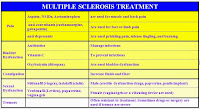Symptomatic therapy for Multiple Sclerosis
In addition to primary care, symptomatic therapy should also be considered such as:
 |
| Table Multiple Sclerosis Symptomatic Medicine |
In addition to primary care, symptomatic therapy should also be considered such as:
1. Spasticity
Mild spasticity can be reduced by stretching and exercise programs such as yoga, physical therapy, or other therapies. Medication administered when there are stiffness, spasm, or clonus on exertion or sleep state. Baclofen, Tizanidine, Gabapentin , and Benzodiazepines effective as antispasm agents.
2. Paroxysmal disorder
In many cases, the use of carbamazepin give a good response in dystonic spasms . Paroxysmal pain may be given anticonvulsant or amitriptyline .
3. Bladder dysfunction
Urinalysis and culture should be considered and infection therapy if needed . The first step is no problem whether the failure to detect bladder emptying or storing urine. Anticholinergic drugs and Tolterodine Oxybutinin effective for failure to store urine outside the presence of infection .
4. Bowel symptom
Constipation is a common problem in Multiple Sclerosis patients and should be treated as soon as possible to avoid complications. Fecal incontinence is quite rare. But if there is, the addition of fiber to harden feces that can help sphingter inept in holding bowel movement . The use of anticholinergic or antidiarrheal quite effective in incontinence and diarrhea that occur together .
5. Sexual symptoms
Appear sexual problems including reduced libido, erectile dysfunction, decrease in lubricant production, increased spasticity, hot taste sensation may occur. In some MS patients, erectile dysfunction can be treated with Sildenafil .
6. Neurobehavior manifestation
Depression occurs more than half of patients with MS . Patients with mild and transient depression supportive therapy can be performed. Patients with severe depression should be given a Selective Serotonin Reuptake Inhibitors ( SSRIs ), which has a sedative effect that is smaller than the other antidepressants . Amitriptyline can be used for patients who have difficulty falling asleep or has a headache .
7. Fatigue
Fatigue can be overcome with enough rest or medication use. Amantadine 100 mg twice a day is quite effective. Modafinil , narcolepsy drug that works as a CNS stimulant has been found to have good effects in MS patients. The drug was given at a dose of 200 mg once daily in the morning. SSRIs also can eliminate fatigue in MS patients.